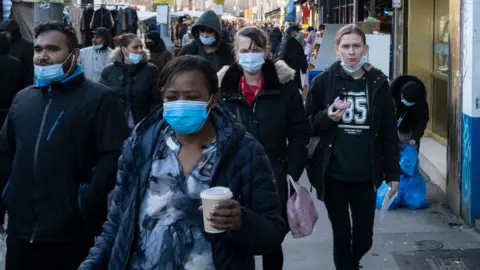Covid infections falling across the UK, says ONS
 Getty Images
Getty ImagesThe number of people infected with coronavirus in the UK is showing the most significant fall since the start of the Omicron wave, the Office for National Statistics (ONS) estimates.
In the week to 15 January, 3.5 million people tested positive - down from 4.3 million the week before, it says.
Covid infections dropped in England, Scotland and Wales - although the trend was less certain in Northern Ireland.
Positive tests also fell in all age groups except young children.
The figures mirror the steep fall in Covid cases shown in government data since early January, which are dependent on people carrying out tests and reporting the results.
In contrast, the ONS tests thousands of people in households, whether they have symptoms or not, and is seen as one of the most reliable sources of infection rates.
Sharp falls
Prof Sir Ian Diamond, the national statistician, said the figures marked "a major turning point" and were "encouraging news", with marked reductions in infections right across age groups.
But he added the UK was still in the midst of an Omicron wave and could not be certain whether the sharp falls would continue.
The prime minister has announced that people will no longer have to work from home in England. Other Covid rules, including vaccine passes and mandatory face masks, will end next Thursday.
In Scotland, most remaining restrictions are being lifted from Monday, and in Wales some rules are also being relaxed.
About 5.3% of the population had the virus in the UK last week, compared to 6.7% the week before, equating to roughly one in 20 people, the ONS says.
Across the UK, the percentage of people testing positive were:
- England: 5.5% (previously 6.9%)
- Wales: 3.7% (previously 5.6%)
- Northern Ireland: 5.7% (previously 5.4%)
- Scotland: 4.5% (previously 5.7%)
In England, Covid infections decreased in all regions except in the North East and the South West, where there was less certainty about the trend.
Infections fell most quickly among people aged 16-24 but they stayed flat in the over 70s (around 3% infected) and rose in primary school-age children (to 8% infected).
